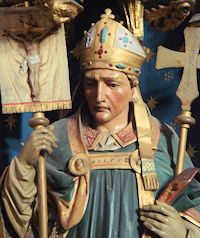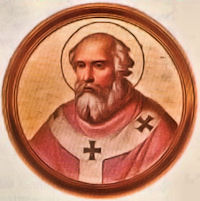Easter: April 19th
Thursday of the Second Week of Easter
Other Commemorations: St. Leo IX, Pope (RM); St. Alphege, Archbishop and Martyr (RM)
» Enjoy our Liturgical Seasons series of e-books!
"The Father loves the Son and has entrusted everything to him. Anyone who believes in the Son has eternal life, but anyone who refuses to believe in the Son will never see life: the anger of God stays on him." (Jn 3:35-36)
Meditation - Every Christian Life, to Be an Uninterrupted Easter Joy
Pray that you may look upon a typically Christian interior life as a celebration of the magnificent Crucifixion-Resurrection victory of Christ Jesus. Let it be for you and uninterrupted harmonization of two experiences, as opposite and seemingly incompatible as cross and joy.
Through the instructions of Jesus to His Apostles and also through the exhortations of the Apostles to their converts, there sounds, like a dominant note, the insistence that every trial and suffering of Christians is positively designed to be so illuminated by rays of Easter light, that all natural darkness and bitterness will be transformed into brightness and sweetness. This does not mean that even the most perfect Christian faith will entirely deaden bodily pains and heartaches and soul sorrows. With only rarest exceptions, our sufferings come to us and are left with us to be felt, and our crosses are to be borne as stern realities. Jesus Himself insists that we shall have sorrow and have reason to lament and weep. (John 16). And though St. Paul thrice besought Him that the angel of Satan might be made to depart form him, Jesus who loved him as a vessel of His election answered: "My grace is sufficient for thee!" Yes, pains and sorrows remain; but through them all, even while experiencing extraordinary tribulation, there is to abide within our soul the anticipated Resurrection peace and joy that reigns in imperturbably Christian hope (2 Cor. 6; 8; 11; 12). — Our Way to the Father by Rev. Leo M. Krenz, S.J.
Pope St. Leo IX
Before becoming Pope, St. Leo IX was known as Bruno. He was bitten by a poisonous reptile when a boy, but St. Benedict appeared to Bruno and cured him. In 1026, Bruno, then a deacon, commanded troops in Italy under the Emperor. The Bishop of Toul died during this time, and upon Bruno's return, he was made Bishop of Toul, where he remained for twenty years. After the death of Pope Damasus II in 1048, Bruno was elected to succeed him. As Pope, he denounced simony and began many needed reforms, traveling extensively to ensure their enforcement. For this reason he was given the title Peregrinus Apostolicus, Apostolic Pilgrim. St. Leo condemned the doctrines of Berengarius, who denied Transubstantiation. He increased the papal territory, though he was criticized by St. Peter Damian when he went to battle to defend it. He opposed the Patriarch of Constantinople, Michael Cerularius; this began the complete separation of Rome from the Eastern Church. Within 40 days of St. Leo's death, there were 70 cures through his intercession.
—Excerpted from Saints Calendar and Daily Planner by Tan Books
Patronage: musicians; Sessa Aurunca, Italy
Highlights and Things to Do:
- Read more about Pope St. Leo IX:
- See the Papal Documents from St. Leo XI.
St. Alphege
 St. Ælfheah or Alphege was born in the year 954, of a noble Saxon family. He first became a monk in the monastery of Deerhurst, near Tewkesbury, England, and afterwards lived as a hermit near Bath, where he founded a community under the rule of St. Benedict, and became its first abbot. (He is also referred to as Elphege, Alfege, or Godwine.)
St. Ælfheah or Alphege was born in the year 954, of a noble Saxon family. He first became a monk in the monastery of Deerhurst, near Tewkesbury, England, and afterwards lived as a hermit near Bath, where he founded a community under the rule of St. Benedict, and became its first abbot. (He is also referred to as Elphege, Alfege, or Godwine.)
At thirty years of age he was chosen Bishop of Winchester, and twenty-two years later he became Archbishop of Canterbury. In 1011, when the Danes landed in Kent and took the city of Canterbury, putting all to fire and sword, St. Alphege was captured and carried off in the expectation of a large ransom. He was unwilling that his ruined church and people should be put to such expense, and was kept in a loathsome prison at Greenwich for seven months.
While so confined some friends came and urged him to lay a tax upon his tenants to raise the sum demanded for his ransom. "What reward can I hope for," said he, "if I spend upon myself what belongs to the poor? Better give up to the poor what is ours, than take from them the little which is their own." As he still refused to give ransom, the enraged Danes fell upon him in a fury, beat him with the blunt sides of their weapons, and bruised him with stones until one, whom the Saint had baptized shortly before, put an end to his sufferings by the blow of an axe.
He died on Easter Saturday, April 19, 1012, his last words being a prayer for his murderers.
His body was first buried in St. Paul's, London, but was afterwards translated to Canterbury by King Canute. A church dedicated to St. Alphege still stands upon the place of his martyrdom at Greenwich.
—Excerpted from The Lives of the Saints, by Alban Butler, Benziger Bros. ed. [1894]
Symbols and Representation: bishop holding an axe; bishop with an axe in his head; bishop carrying stones in his chasuble
Patronage: Greenwich, England; kidnap victims; Solihull, England
Highlights and Things to Do:
- Read more about St. Alphege:
- Pray the Anglo-Saxon Prayer to St. Alphege.
- His remains are under the high altar at Canterbury Cathedral. There is a stained glass window depicting "The Life of Alphege," and the window is one of the earliest surviving windows at Canterbury. "The Siege of Canterbury" panel shows the city besieged by raiding Danes in 1011 with Archbishop Alphege taken hostage. When Alphege demanded the poor not to pay the ransom, the enraged Danes are said to have pelted him to death with ox bones. An eyewitness account of the event was probably known to the artist of this panel.






